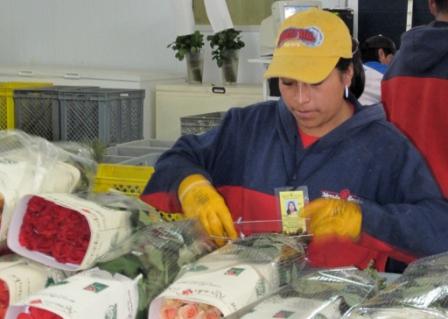Center for Fair & Alternative Trade
"Fair Flowers: Fair Trade, Gender & Socio-Economic Conditions in the Global Cut Flower Network"
Presented by Laura T. Raynolds, CFAT Co-director & Professor of Sociology, CSU

On April 13, 2010, Dr. Laura Raynolds, CFAT Co-Director and professor of Sociology at CSU, presented “Fair Flowers: Fair Trade, Gender and Socio-Economic Conditions in the Global Cut Flower Commodity Chain” to CFAT faculty, students, and associates. Dr. Raynolds outlined her ongoing research on Fair Trade flower production in Ecuador for US markets. This project is the first ever comprehensive investigation of Fair Trade flowers in Latin America. Preliminary findings provide important insights into the benefits and challenges of Fair Trade in improving the conditions of hired workers, many of whom are women.
This project focuses on three key questions:
- What types of global ties exist in FT flower networks and how have Ecuadorian plantations been integrated into those networks?
- How successful has the FT initiative, which was designed to address the conditions of peasant producers, been at promoting partnerships with worker organizations and improving the conditions of workers employed by certified plantations?
- How does FT affect gender dynamics on certified plantations and what are the implications of certification for female as well as male workers?
Drawing on a commodity network approach, as well as peasant, labor, and gender studies, Dr. Raynolds is analyzing Fair Trade flower markets, the Ecuadorian plantations supplying those markets, and the conditions of workers on those plantations. She is using multiple research methods including document reviews, ethnographic observations, 60-75 semi-structured interviews with Ecuadorian and US Fair Trade network actors, plantation managers, and worker organization leaders, focus groups with 40-56 female flower workers, and a random sample survey of 160 male and female workers.
In the seminar, Dr. Raynolds presented early findings from the worker focus groups as well as interviews with Ecuadorian Fair Trade network actors and company managers at two Fair Trade flower plantations during her March fieldwork. Her research finds that Fair Trade enterprises are meeting and surpassing Ecuadorian legal requirements related to the provision of minimum wages, maternity leave, safe and healthy work conditions, and other worker benefits.
Dr. Raynolds explained how workers are engaged in two organizations: The Comision Mixta (Mixed Commission) and the Comite de Trabajadores (Workers’ Committee). The Comision Mixta is a committee of managers and workers that administers the Fair Trade social premium, which has been used to fund computer centers, scholarships, health services, credit program and a range of other ambitious social programs. The Comite de Trabajadores in turn is charged with representing worker interests to management, filling an important gap since unions are largely absent in the Ecuadorian flower sector.
Dr. Raynolds will continue the research project through August 2011, visiting Ecuador regularly and communicating by phone and email. In addition, CFAT graduate student Erica Schelly is currently being funded by the research grant to completing 6 months of field observations on flower plantations and worker surveys in Ecuador.
